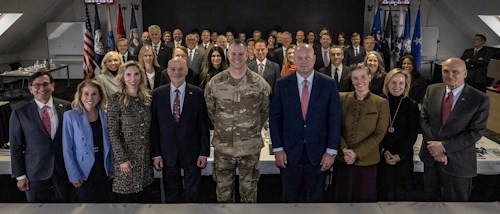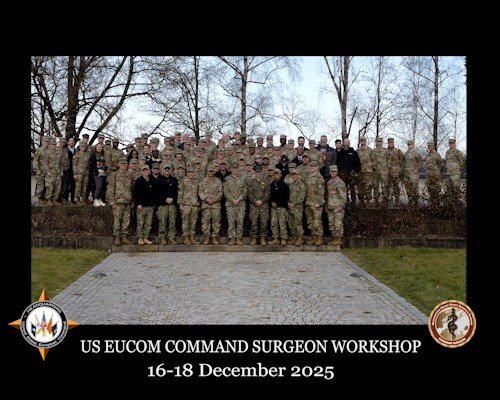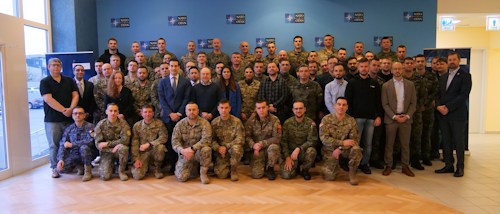His comments follow:
Thank you. It’s a privilege to be here with this prestigious group--the National Defence Course Association is a tremendous program, and it demonstrates the interest and participation of Finnish citizens in your national security issues. We often talk about the necessity of adopting a “whole-of-government approach” to security, and this association, which draws together representatives from all sectors, public and private, provides a strong example of how an active, engaged citizenry can help us with comprehensive security policies.
I’m also honored to be in Finland in 2017, on the 100th anniversary of your nation’s independence. What your country has accomplished in the last century is remarkable--you are a model of self-reinvention. The list of areas in which you top world-wide rankings --social stability, safety, freedom, gender equality, education, literacy, innovation, health and happiness--that is truly impressive.
You are also an Enhanced Opportunity Partner with NATO, making significant contributions to operations in places like Kosovo and Afghanistan. You are contributing to the Global Coalition to Defeat ISIS and have troops in Iraq training Iraqi troops. Closer to home, in the Baltic Sea region, you are a
leader in the Nordic Defense Cooperation (NORDEFCO), which is an important stability and security structure, and you participate in such exercises as BALTOPS 2017.
You are also supporting the effort to adapt to the changing character of war, and the establishment of the European Centre of Excellence for Countering Hybrid Threats in Helsinki this past April was an important
milestone in Europe’s efforts to develop counter-hybrid strategies--I look forward to the work and solutions that will come out of this Centre.
Concerning the Arctic, Finland now holds the Chairmanship of the Arctic Council during a dynamic period in the High North that comes with economic and political as well as military implications, and you are involved with meetings of the Arctic Security Forces Roundtable.
Finally, you are also looking for pragmatic solutions to shared security and defense with the EU; I noted that my friend General Kostarakos had a chance to talk with you last fall. These are just some of the areas that you’re involved in, but it’s clear that Finland plays a significant role in European stability.
Let me just say how much we in the U.S. military value Finland’s partnership. We are committed to increasing our bilateral military collaboration, and as you know, the U.S. and Finland signed a defense
cooperation pact last fall, pledging to deepen our ties in such areas as information sharing, cyber defense, and special operations. U.S. and Finnish SOF participate annually in winter warfare training exercises, and last year marked the first training deployment of U.S. F-15s to Finland as part of Operation Atlantic Resolve.
Finland works with EUCOM on cyber security issues, and EUCOM now proudly hosts a Finland liaison officer. The U.S. also recognizes Finland’s leadership in security technology and industry--and I would just mention your experience in ice-strengthened ship designs and icebreaking operations as an example. We also have great respect for your resilience to targeted disinformation and propaganda, I think we can learn from you in this area as well. I appreciate the statement by your director of government communications, Markku Mantila, who recently said: "good elementary school and elementary school teachers are the first line of defense against information influence. The more educated people we have in Finland, the more difficult it is to deceive us."
This is a smart approach, and it’s clear that education must be part of our strategy to counter disinformation.
Overall, the US views Finland as a strong, reliable, resilient, and innovative defense partner, and we are eager to work more closely with you on European stability and security.
Now let me turn to “Signature Strategic Issues."
I have signature strategic issues that I generally cover when I speak about trans-Atlantic security.
The first is that this is a theater in transition. I often say that this is Europe’s most dynamic security environment in recent history. Threats are trans-regional, multi-domain and multi-functional. As a result, we recognize that we have to change our posture, we have to change the way we think about readiness, we have to change the way we train, and we have to change our mindset. For EUCOM headquarters, this means that we are now focused on deterrence and defense – where we were once just focused on
engagement and assurance.
The second is the importance of unity with our Allies and partners. The best response to all of the challenges we have in Europe is to respond with our partners as one. It is through partnerships that we'll be strong and best deal with the many challenges that we see in this complex world.
The remaining signature issues are what I call the “three R’s”.
Russia, Radicals and Relevance.
Russia. Russia’s goal is to re-establish itself as a global power – to regain its great power status – and to ensure its influence or strategic depth along its western border. As a result, it is pushing back on
international norms – undermining the western, rules-based order. It is using asymmetric activities, such as disinformation and interference in sovereign nation’s politics to protect its interests. Also, Russia will use its military as it does in Ukraine, to reach its ends – and its military is modernizing, at a steady clip, its conventional and nuclear forces, and upgrading its capabilities in the arctic. Our priority is to deter Russia from further acts of aggression and to ensure the defense of Europe. This is best done as NATO allies and partners – acting with strength and balance.
The next is Radicals, or violent extremist organizations. This is a long term challenge that impacts every Nation in the Euro-Atlantic region. And is a threat that is well resourced, agile and global. It will take a
network of Nations to defeat this violent extremist network. I appreciate Finland’s role in the coalition network that will defeat ISIS.
Finally, the third ‘R’ is Relevance. We – the U.S., Finland, and our partners, must provide a military force that is relevant to the challenges we face. They must be postured with the right capabilities to retain our
dominance in light of Russia’s modernization. They must be prepared and effective in a complex and changing strategic environment.
So, Europe as a theater in transition, the necessity of strong partnerships, and the three “R” – Russia, Radicals and Relevance and I think should generate some good questions.
First, let me thank you for the opportunity to speak here today. I value – the U.S. values Finland’s courageous history, and we value your partnership in defending Europe – together we can ensure a Europe that is whole, free, and at peace.




